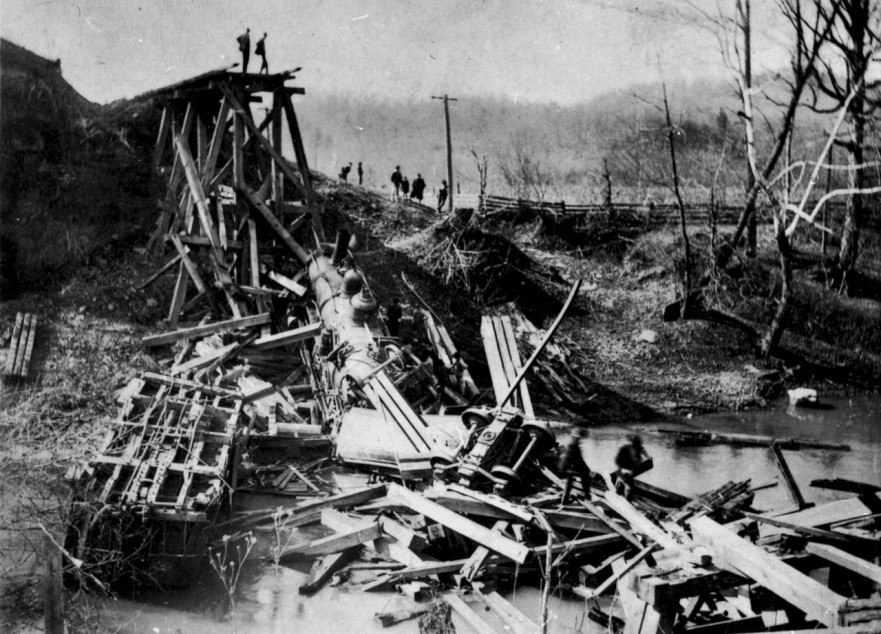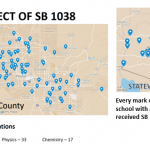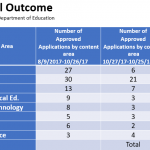In the book Collateral Damage, Nichols & Berliner (2007) provide a solid argument that high-stakes testing corrupts schools, harms students, and reduces teacher instruction from dynamic, engaging content to noncomplex, basic skill drills that improve student test scores. I read Collateral Damage last year and felt really, really glad to work in preschool. At the time, I felt like preschool was sheltered from the misguided, high-stakes assessment practices that have been thrust upon K-12 education.
This year has opened my eyes because I have seen “high stakes” testing assessment thrust down to our preschool programs. I work next door to an early childhood preschool program that provides awesome instruction for young students in our school community. Some kids pay tuition, but many are fortunate to receive scholarships from an Arizona program called Quality First. Quality First scholarship money is generated by the tobacco tax that Arizona voters passed in 2006. In general, this is a great program that benefits kids all over the state. As a special education teacher, my program does not receive any funds from Quality First. However, my students benefit because the scholarship money provides a regular education class next door—offering my students an opportunity to mainstream with non-disabled kids on the playground daily.
As with all-things-education today, someone proposed that more assessment was needed for Quality First programs. Therefore, they established a Star Rating system for programs that receive Quality First funding. I won’t get into details, but this is an extensive assessment process built around high stakes practices. At my site, our Star Rating score is determined by two-days worth of observations rather than long-term assessment of teacher instruction or student progress. A few observations determine whether we pass. And if we don’t “pass,” the regular education program loses all Quality First funding. Talk about high stakes.
For the first time this year, our Star Rating includes assessment of our special education classrooms (that do not receive funding!) We’ve been in the assessment window for a few weeks. Using the Early Childhood Environmental Rating Scale (ECERS), assessors came and drew randomly to decide which program to evaluate. The first day, they chose a special education classroom on our campus (a class for students with Developmental Delays that receives no Quality First funding). The next day, they chose my program (a class for students with autism and severe communication delays that receives no Quality First funding). The scores from our two rooms will be used for the Star Rating of the regular education preschool program, a program that was not observed at all by this scale. (Thankfully, we know we passed—but the scores have not yet been released!)
Next, the assessors came for the CLASS observation scale. Once again using a random draw system, they chose the preschool class with Developmental Delays twice and observed for two class periods—even though the Quality First policy states that special education CLASS scores cannot be included in the Star Rating score. (If you’re confused about why they would waste time observing classes that don’t “count,” you are not alone!) By that point, the assessors had observed four special education classes and no regular education classes—in order to determine the future funding of the regular education program at my site.
The CLASS assessors finally observed the regular education teacher last week—a wonderful teacher (who is actually the “Teacher of the Year” at my school this year!) She is an accomplished teacher with around twenty years of experience. She is loved by kids, teachers, and families. By this point, she was pretty unwound by the process. Wouldn’t you be nervous if other teachers’ observations were being used to determine the continuation of your program? She was cracking regular jokes about looking for a new job in case they close the program down. I just felt sad. In my opinion, this type of high stakes is like professional terrorism.
My great colleague did what she does best that day—she provided great instruction with caring developmental practices for students ages 3-5. Sadly, she was overcome with worry by the end of the day because it wasn’t “perfect.” In her words, she said, “The kids were so needy today!” Apparently, there were lots of untied shoes, emotional meltdowns, and social conflicts like sharing or taking turns. In my words, it was a typical, authentic preschool day! But to my colleague, this was devastating. The CLASS assessors will only come twice for her score—and this happened to be a day when the ‘high-level’ questions had to be set aside to wipe some tears and blow some noses. Sadly, wiping tears and blowing noses are not part of this high stakes rubric. But you know what? Wiping tears and blowing noses are good preschool practices, caring for kids the way they need it. Why are we under-valuing that and terrorizing teachers with narrow, high-stakes assessments for one day of teaching?
Watching my colleague lament about the day made me so mad about these silly practices we have implemented in our state. I’m not against assessment or feedback. Our team is actually looking forward to the feedback because it might improve our teaching practices. But I have a serious problem with high stakes assessments that make good teachers question their teaching practices and worry that their program might be shut down. These things contribute to attrition in the teaching field because the pressure is so great. We are so busy assessing “teaching” that we have stopped valuing the importance of caring for kids. We aren’t getting the REAL snapshot anymore. The worst part of all? Some really great moments happened that day, and the assessors might not have even noticed them. There were kids with major breakthroughs in language and social-emotional skills. But this great teacher had little time for celebration because she was so overcome with worry that it hadn’t been “enough” for the score. Don’t anyone tell me that kids are the only ones negatively affected by the stress of high stakes testing. Our preschool team has been meeting about this ALL year and we’ve had teachers crying in meetings (myself included!) because we were so worried about earning a score that will retain the programs. Our supervisor was incredibly supportive and reassuring, but there is no amount of reassurance that calms nerves when the price is so great.
Now, I’m pretty sure we will earn a Star Score that passes, and I certainly hope the regular education program will be next door to me for many years to come. But I think it’s time for preschool teachers to advance the dialogue about what we are actually measuring in early childhood education—and K-12 education, too. I am tired of seeing good teachers demoralized and undervalued with assessment practices that only capture part of the picture. High stakes testing provides a one-time snapshot of learning or teaching that doesn’t represent the holistic needs of kids today. And the more we let high-stakes assessment push aside the good daily practices of caring for kids, the more we all suffer the collateral damage.










Comments 2
Jess, how do you all keep track of all those systems and scales? Thinking about this drove me into the same state of mind as I get when I try to do my taxes. You all must live in that state. What jumped out more than anything was that even after all that intrusion, or because of it, a real snapshot of your work isn’t possible. Here’s a question – we talk a lot about the megabucks that go into testing: Is someone making a ton of money from all this assessment? Who’s paying for it? Does anyone assess the assessors. Maybe we can create Teachers Assessment Scale for Evaluator Ranking (Get it? TASER?) and give them a I’m having a fantasy of somehow giving them a taste of their own medicine.
Yeah, Sandy! It makes me think about the same things. I wonder why we are spending tax dollars having assessors assess classrooms that “don’t count.” What’s the point of a random draw that doesn’t matter? I am concerned that the plan is to use the CLASS assessment as a tool to measure special education preschool teachers in the future (hence, the assessments that “don’t count” this year to get some baselines for the future). Hopefully, it’s misplaced worry instead of rational fear. If that happens, I will be very sad because the CLASS tool does not measure language at the level appropriate for my students. I am hopeful that preschool special education teachers can really advance the dialogue around the appropriateness of these assessment practices NOW before they become mandatory practices in the future. High stakes assessments are not appropriate for any grade because they don’t provide a real snapshot of learning or teaching. Assessment is a great tool for learning about student learning and learning about teachers teaching, but not under the conditions I currently see in preschool in Arizona. Thanks for your comments!